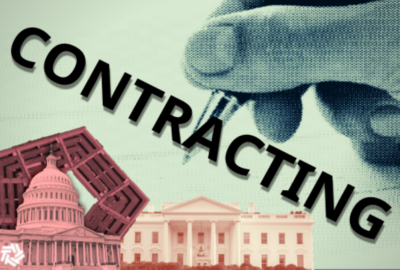Hubbard Radio Washington DC, LLC. All rights reserved. This website is not intended for users located within the European Economic Area.
A troubling small business trend is getting worse
In the last ten years, the number of small businesses doing business with the government has fallen by a third.
Bloomberg Government recently underscored something federal contracting data has been showing. In the last ten years, the number of small businesses doing business with the government has fallen by a third. Small companies staying in the market specialize in it. My next guest says the regulatory burden the government requires keeps non-specialized, so-called mom-and-pop business out of the market. Long time federal sales and marketing consultant Larry Allen joined the Federal Drive with Tom Temin to discuss.
Interview Transcript:
Tom Temin And I guess the question is, should the government be concerned with the fact that fewer and fewer small businesses are participating because the dollars going to the remainder keep rising?
Larry Allen Tom, if you hear the government acquisition professional speak, particularly those in the Department of Defense, it’s already a concern that we’ve lost this many small businesses and are having particular trouble attracting new ones to the market. And if you listen in DoD, they’re saying we need these businesses because they’re the innovators, the ones that have the new technologies, the ones that can help us keep our national security, technological edge. And they’re just not there, at least not in the numbers they used to be, or in the numbers that are deemed to be enough, whatever enough means. Otherwise, we wouldn’t have the officials talking about it. But the bigger problem is that while the acquisition officials recognize this as an issue, no one else does. Policymakers and the legislators are busy putting new rules and requirements on the acquisition system. So, when the headlines from The Hill read, hey, we want the government to do more business with small businesses. No, you don’t, because the next thing you do is turn around and pass bills that create more rules. And then the administrative function in government certainly hasn’t been slacking in creating its own rules. Tom. Hey, this is not a partisan issue either, and I don’t want to paint it that way, that this is an issue that you get when people try to do too much with the government acquisition system other than efficient acquisition.
Tom Temin Right. The rules stem from the worry from two things. One, there’s some larger societal good that is perceived by at least some officials to be served by these rules. And then there is also the fear that some tiny thing could possibly go wrong. And so, there’s a risk aversion that leads to more and more rules. I mean, I think those are the two big sources.
Larry Allen Well, I think you’re on the right track with that. You know, we are certainly we’ve all heard the statement the perfect is the enemy of the good. And the fact is that that’s really true in government acquisition today. If you talk to government CIO type of people, you talk to other program managers inside government. You know that this is, generally speaking, a very risk averse government market that contractors are selling into. And if you’re risk averse, then you know you’re going to be favoring the companies that you’ve used before, the acquisition methods that you’ve used before, and the technologies that have already been proven to work in the marketplace. You’re not going to be the first adopter of any new technology unless you are really the rare bird in government acquisition.
Tom Temin And what do you think are the principal areas of rules coming or already imposed that might be the worst burden on small businesses?
Larry Allen I’m Tom, I see two types of rules that are coming out, and there are a lot of them. But just to put them into large categories, there are cyber related rules. And, you know, to a certain extent that makes sense. You understand that the government wants to do business with cybersecure companies and that, you know, we can’t have people hacking into systems that could jeopardize the government supply chain. On the second, though, we had a lot of what I call the social impact goals greenhouse gas emission, sustainable procurement, you know, what do you want? Do you want an acquisition system that meets national security needs in a timely manner and can attract, companies that help you keep your national security edge? Or do you want to be able to say, hey, you know, we reduce greenhouse gas emissions by 0.00, whatever percent? Because you’re not going to really be able to have both. And even in the area of cyber security, well that’s important. You know, we know that the government has a tendency to over classify things. And it’s kind of the same thing with cybersecurity. Cybersecurity is a perceived good, regardless of what you’re buying and who you’re buying it from. I think a little bit more of a nuanced approach that’s adaptable to, the type of situation that a government agency is facing when they’re actually making a buy. Not everything needs that high level of cyber security.
Tom Temin You bet. We’re speaking with Larry Allen, president of Allen Federal Business Partners, and you looked at what is cooking in the FAR Council, and it’s quite a list a time.
Larry Allen We’re looking at about 16 pages of proposed and interim rules that the FAR Council is currently considering. That’s a lot of regulatory additions. We’re not really talking about subtracting any rules either. So, when you’re looking at this, you know, this group of new requirements that are just going to raise the bar to market entry, you really got to scratch your head. Do we need each and every one of these rules. Do we need to take a look rather not just at what we’re thinking about adding, but what we’ve already got. This is not pie. Pie in the sky. This will never happen. Things both you and I, Tom, have been around long enough to remember that the government’s actually done this exercise before, and that there was a time when we actually not only didn’t add new rules, but particularly for commercial item acquisition, we got rid of existing rules. That’s the type of thing that I’m advocating for.
Tom Temin All right. And switching gears here and you know, let’s hope somebody is listening. Because if you want those small businesses to participate, they have to have some incentive. And not just simply big compliance regime. Fair to say.
Larry Allen Well, right. And so, you’ve got to, I think the biggest thing that Congress can do to attract companies to the market is pass appropriations bills on time. And if you’re going to be, because small businesses in particular are really dependent on cash flow. So, if you’re going to be in a position where you’re trying to leverage small business technologies and innovative companies, the first thing you have to do is provide the money required to attract those businesses, so that the agencies can put those projects into place. When you are cutting the fiscal year by a little bit more than in half this year. That’s not a good look. You know, I’ve talked to a number of small businesses that are doing business in the market today. And, you know, they’re hurting for cash flow. Some have laid off people, some are, you know, looking for another round of investor funding to tide them over. You know, this is what we’re doing to our small businesses when we don’t pass appropriations bills until the end of March.
Tom Temin And sometimes small businesses enter into teaming agreements. And you’re pointing out to people this week of a New York court decision upholding contractor teaming agreements. What is the case and what’s the significance of it?
Larry Allen I thought this was a really interesting case. A number of federal courts have held that contractor teaming agreements, which are what they say they are, their agreements for companies to come together to pursue mutual business. Most federal district courts have held that those are agreements to agree and therefore are not enforceable as actual contracts. But we had the New York federal law come out, recently and upheld the validity of a couple of teaming agreements based on, their applicability to New York law, federal court saying in New York, this teaming agreement is actually enforceable as a part of law. I think that’s good news for contractors. Companies enter into teaming agreements, oftentimes with the intent and belief that they really are contracts and more than agreements to agree. They are organizational compacts, if you will, to pursue specific pieces of business. And oftentimes people are successful in pursuing those pieces of business. So there really is more to a teaming agreement than just saying, hey, come around at 3:00 on Tuesday and we’ll talk about this. And I think that’s what the federal court held. And that’s good news for contractors.
Tom Temin Larry Allen is president of Allen Federal Business Partners, as always. Thank you so much, Tom.
Larry Allen Thank you. And I wish your listeners happy selling.
Copyright © 2024 Federal News Network. All rights reserved. This website is not intended for users located within the European Economic Area.
Tom Temin
Tom Temin is host of the Federal Drive and has been providing insight on federal technology and management issues for more than 30 years.
Follow @tteminWFED





